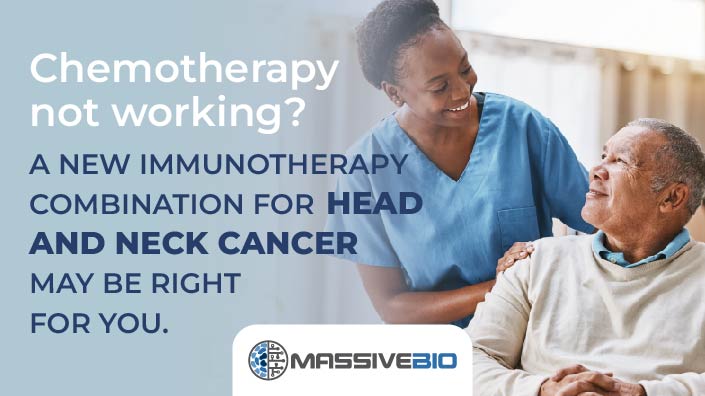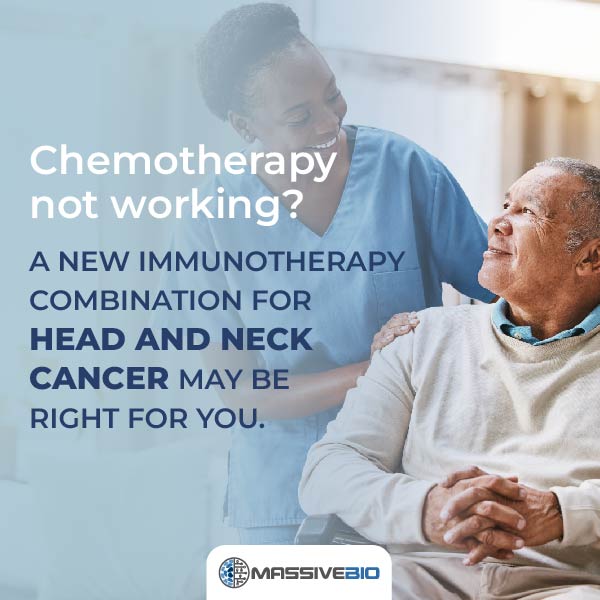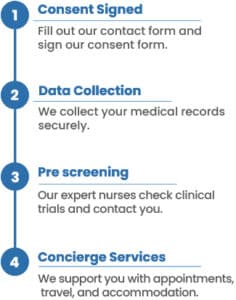News Massive Bio Has Onboarded Over 120,000 Cancer Patients To Find Their Clinical Trial
Head and Neck Cancer Clinical Trials


Start Your Journey
Compliant with

You can receive a guidebook with information about cancer clinical research by filling out the form.
The Latest in Head and Neck Cancer Treatment Options
Many people have questions about head and neck cancer, but there’s new hope. Our platform connects you with the latest clinical trials, focusing on Advanced head and neck cancer and metastatic head and neck cancer. We make it easier for patients to find and join these new trials, giving them access to the most recent treatments.
Our system connects you with the newest clinical trials, providing new options for people dealing with head and neck cancer. We give you all the details about trials for every stage of the disease, especially Stage 3 and Stage 4. These trials offer new treatment methods that aren’t widely used yet, aiming at the unique markers of your cancer. With our help, you get the chance to be proactive in treating your condition.
How our system works
After reviewing your medical records and running the information through our AI powered system, we identify clinical trials you may be eligible for. Not only that, we also provide a concierge service that will allow for a smooth transition into the clinical trial.
Our team of specialized nurses and physicians will make sure that every detail of your participation in the trial is taken care of before, during and after your enrollment.
All the services provided are completely free for you and your treating oncologist.
Understanding the disease
What is Head and Neck cancer?
Head and neck cancer is a term used to describe a range of cancers that develop in the head and neck region. This includes cancers of the mouth, nose, throat, larynx (voice box), salivary glands, and middle ear. These cancers usually begin in the squamous cells that line the moist, mucosal surfaces inside the head and neck (for example, inside the mouth, the nose, and the throat). Such squamous cell cancers are often referred to as squamous cell carcinomas of the head and neck.
The types of head and neck cancer include:
1. Oral and Oropharyngeal Cancer: This includes cancers of the mouth, tongue, and throat. It can affect the lips, the front two-thirds of the tongue, the gums, the lining inside the cheeks and lips, the floor of the mouth under the tongue, the hard palate, and the small area of the gum behind the wisdom teeth.
2. Nasopharyngeal Cancer: This affects the part of the throat that connects the back of the nose to the back of the mouth.
3. Hypopharyngeal Cancer: This type affects the lower part of the throat, just above the esophagus and windpipe.
4. Laryngeal Cancer: This affects the larynx or voice box, which is located at the top of the windpipe, or trachea.
5. Nasal Cavity and Paranasal Sinus Cancer: These cancers affect the nasal cavity (the space behind your nose) and the sinuses (small, air-filled cavities inside your nose, forehead, and cheekbones).
6. Salivary Gland Cancer: This type of cancer affects the salivary glands, which are responsible for producing saliva.
Risk factors for head and neck cancers include tobacco use, heavy alcohol consumption, certain human papillomavirus (HPV) infections, prolonged sun exposure (for lip cancer), and others. Symptoms can vary depending on the specific location of the cancer but may include a lump or sore that does not heal, a sore throat that does not go away, difficulty swallowing, or a change or hoarseness in the voice.
What are the treatment options
for head and neck cancer?
The treatment for head and neck cancer depends on several factors, including the type and stage of the cancer, its location, the patient’s overall health, and personal preferences. Here are the main treatment options:
1. Surgery: Surgery is often a primary treatment for head and neck cancers. The goal is to remove the cancerous tissue while minimizing damage to the rest of the head and neck region. The extent of surgery depends on the size and location of the tumor.
2. Radiation Therapy: This treatment uses high-energy beams, such as X-rays or protons, to kill cancer cells. Radiation therapy can be used as a standalone treatment, after surgery to kill any remaining cancer cells, or in combination with chemotherapy.
3. Chemotherapy: Chemotherapy uses drugs to kill cancer cells. It can be given alone, but it is often used in combination with radiation therapy. Chemotherapy can shrink tumors before surgery or destroy cancer cells that might remain after surgery.
4. Targeted Therapy: Targeted therapy drugs target specific abnormalities within cancer cells. For certain types of head and neck cancers, targeted therapy might be an option, especially if the cancer has specific genetic mutations.
5. Immunotherapy: This treatment uses the patient’s immune system to fight cancer. It works by helping the immune system recognize and attack cancer cells.
NGS testing and clinical trials
Next-Generation Sequencing (NGS) is vital in linking patients with specific genetic mutations in their cancers to clinical trials for targeted treatments. This approach, part of personalized medicine, increases the effectiveness and success rates of these trials by ensuring patients receive therapies most likely to work for their particular cancer type.
Head and neck cancers, like many other types of cancer, can be associated with various genetic changes. These changes can affect oncogenes, tumor suppressor genes, and genes that are involved in DNA repair. Here are some of the key genes and genetic changes often associated with head and neck cancers:
1. TP53: The TP53 gene, which produces the p53 tumor suppressor protein, is frequently mutated in head and neck cancers. p53 plays a crucial role in regulating cell growth and apoptosis (programmed cell death), and its dysfunction can lead to uncontrolled cell proliferation.
2. EGFR (Epidermal Growth Factor Receptor): Overexpression or mutation of EGFR is common in head and neck cancers and is associated with tumor growth, progression, and resistance to certain therapies.
3. HPV-Related Genes: Human Papillomavirus (HPV)-associated head and neck cancers, particularly oropharyngeal cancers, often involve integration of HPV DNA into the host genome. This can lead to overexpression of viral oncogenes like E6 and E7, which in turn can inactivate p53 and retinoblastoma (RB1) tumor suppressor pathways.
4. PIK3CA: Mutations in the PIK3CA gene, which is part of the PI3K/AKT/mTOR pathway, are found in a subset of head and neck cancers. These mutations can lead to increased cell growth and survival.
5. CDKN2A: Alterations in the CDKN2A gene, which encodes for the p16 protein, are common in head and neck cancers. p16 is involved in cell cycle regulation, and its loss can contribute to uncontrolled cell division.
6. NOTCH1: Mutations in NOTCH1, a gene involved in cell differentiation and apoptosis, have been identified in head and neck cancers. These mutations can contribute to the development and progression of cancer.
7. HRAS and KRAS: Mutations in HRAS and KRAS genes, which are part of the RAS/MAPK pathway, can be found in head and neck cancers. These mutations generally lead to increased cell proliferation and survival.
The Role of Clinical Trials in
Head and Neck Cancer
Clinical trials play a crucial role in the treatment of stage 3 and stage 4 Head and Neck cancer for several reasons:
1. Access to New Treatments: Clinical trials offer patients a chance to try new treatments that could work better, especially for serious illnesses like advanced Head and Neck cancer, where usual treatments might not work well.
2. Improving Outcomes: By participating in clinical trials, patients contribute to knowledge that could improve survival rates and quality of life for future Head and Neck cancer patients.
3. Comprehensive Care: Patients in clinical trials often receive a high level of care and are closely monitored by a dedicated team of healthcare professionals and researchers.
4. Hope for the Future: For many patients with advanced Head and Neck cancer, participating in a clinical trial provides hope—both for themselves and the possibility that their participation will help others in the future.
5. Advancing Research: These trials are essential for research, helping scientists understand how new treatments work and for whom they work best. This can lead to the development of more effective treatment strategies and personalized medicine.
We combine the power of technology with our dedicated team of medical providers to find you the best treatment options available.
How Massive Bio Helps Patients With Head & Neck Cancer
Massive Bio offers a quick, easy, and FREE way to find clinical research opportunities for patients like you. With our unique clinical research matching system and compassionate team, Massive Bio can rapidly match you to a clinical research study for those with head & neck cancer.


Talk to us. Our nurses and patient relations coordinators are here and happy to help you. You are not alone in this fight.
Call +1 844 627 7246What is a Lymphoma clinical trial?
Clinical trials test the latest scientific advancements in Lymphoma treatment. Patients who choose to enroll in trials can receive cutting-edge treatment and high-quality care under the direction of scientists, doctors, and researchers. Lymphoma patients might gain access to promising drugs and innovative treatments long before they're made available to the public.
What Are Clinical Research Studies?
Cancer is an unfortunate reality that touches many of us at some point in our lives. If you or a loved one has cancer, you may have heard or read that clinical research could offer access to potential new treatments. But what exactly is clinical research? In this video, Massive Bio co-founder Arturo Loaiza-Bonilla, MD, explains how clinical research studies work, what to expect if you enroll in one, and why clinical research can be an important treatment option for many cancer patients.
We dream of the day when cancer disappears from our lives. Massive Bio is working tirelessly to achieve that goal.
-
Who is Massive Bio?
Who is Massive Bio?
Massive Bio has helped to match cancer patients to clinical research studies of new oncology therapies. Massive Bio has helped more than 120,000 cancer patients in 25 countries across three continents.
-
What is the process?
What is the process?
To find the best clinical research study for you, we need your medical history and consent. You can provide this consent by filling out the form on this page and the following pages. Once you complete that, our patient relations coordinators contact you to discuss the details and provide further information for clinical research matching report.
-
Why do I have to provide my medical records to enroll in a clinical trial?
Why do I have to provide my medical records to enroll in a clinical trial?
To enroll in a clinical trial, you must meet eligibility criteria that is established by clinically trained researchers who are conducting the investigation. That includes detailed information about type of cancer, treatment history, response to treatment, and other data that is collected in medical records.
-
What should I do if I don’t have my medical records?
What should I do if I don’t have my medical records?
If you are being treated for cancer or any other disease, your doctor should have a complete record of your medical care, including specific information about what form of the cancer and stage of the disease you have and what treatments you have received. Your patient relations coordinator will contact you and inform you details and whole process.
-
What are the costs associated with Massive Bio’s services?
What are the costs associated with Massive Bio’s services?
Massive Bio provides its services to the patients and their doctors at no cost—you won’t have to pay anything to receive a clinical-research matching report. There are no hidden costs involved.
-
How does Massive Bio protect my personal information?
How does Massive Bio protect my personal information?
Massive Bio strictly adheres to all HIPAA guidelines and international regulations focused on maintaining your privacy. We take extra measures to secure your personal information, ensuring it is protected beyond the mandatory requirements.
-
Where can I find clinical research studies in my area?
Where can I find clinical research studies in my area?
Your doctor may know of a clinical research study being conducted in your area that’s recruiting participants and is right for you. However, Massive Bio uses its artificial intelligence-powered platform to match patients to clinical research studies of treatments that help find new ways of using already approved drugs and are being conducted in a geographical location that makes sense for you.
-
Can I continue seeing my doctor or oncologist while also taking services of Massive Bio?
Can I continue seeing my doctor or oncologist while also taking services of Massive Bio?
Yes, Massive Bio keeps your doctor up to date on your status throughout your participation.






